- Home
- Upton Sinclair
The Machine Page 2
The Machine Read online
Page 2
JACK. I should think I did! Julia, that was a dandy!
JULIA. Do you think so?
JACK. I do, indeed. You've made a hit. I heard a dozen people talking
about it.
JULIA. Indeed?
JACK. You've come to be the champion female muck- raker of the
country, I think.
[JULIA laughs.]
JACK. Why did you want to see me so specially tonight?
JULIA. I've a friend I want you to meet. Somebody I'm engaged in
educating.
JACK. You seem to have chosen me for your favorite proselytizer.
JULIA. You've seen things with your own eyes, Jack.
JACK. Yes; I suppose so.
JULIA. And you know how to tell about them. And you've such an
engaging way about you...nobody could help but take to you.
JACK. Cut out the taffy. Who's your friend?
JULIA. Her name's Hegan.
JACK. A woman?
JULIA. A girl, yes. And she's coming right along, Jack. You must take
a little trouble with her, for if we can only bring her through, she
can do a lot for us. She's got no end of money.
JACK. No relative of Jim Hegan, I hope?
JULIA. She's his daughter.
JACK. [With a bound.] What!
JULIA. His only daughter.
JACK. Good God, Julia!
JULIA. What's the matter?
JACK. You know I don't want to meet people like that.
JULIA. Why not?
JACK. I don't care to mix with them. I've nothing to say to them.
JULIA. My dear Jack, the girl can't help her father.
JACK. I know that, and I'm sorry for her. But, meantime, I've got my
work to do . . .
JULIA. You couldn't be doing any better work than this. If we can make
a Socialist of Laura Hegan . . .
JACK. Oh, stuff, Julia! I've given up chasing after will-o'-the-wisps
like that.
JULIA. -But think what she could do!
JACK. Yes. I used to think what a whole lot of people could do. You
might as well ask me to think what her father could do . . . if he
only wanted to do it, instead of poisoning the life-blood of the city,
and piling up his dirty millions. Go about this town and see the
misery and horror . . . and think that it's Jim Hegan who sits at the
top and reaps the profit of it all! It's Jim Hegan who is back of the
organization . . . he's the real power behind Boss Grimes. It's he who
puts up the money and makes possible this whole regime of vice and
graft . . .
JULIA. My dear boy, don't be silly.
JACK. How do you mean? Isn't it true?
JULIA. Of course it's true . . . but why declaim to me about it? You
forget you are talking to the champion female muckraker of the
country.
JACK. Yes, that's right. But I don't want to meet these people
socially. They mean well, a lot of them, I suppose; but they've been
accustomed all their lives to being people of importance . . . to have
everybody stand in awe of them, because of their stolen money, and all
the wonderful things they might do with it if they only would.
JULIA. My dear Jack, did you ever observe anything of the tuft-hunter
in me?
JACK. No, I don't know that I have. But it's never too late.
JULIA. [Laughing.] Well, until you do, have a little faith in me! Meet
Laura Hegan, and judge for yourself.
JACK. [Grumbling.] All right, I'll meet her. But let me tell you, I
don't propose to spare her feelings. She'll get things straight from
me.
JULIA. That's all right, my boy. Give her the class war and the
Revolution with a capital R ! Tell her you're the only original
representative of the disinherited proletariat, and that some day,
before long, you intend to plant the red flag over her daddy's palace.
[Seriously.] Of course, what you'll actually do is meet her like a
gentleman, and tell her of some of your adventures in Russia, and give
her some idea of what's going on outside of her little Fifth avenue
set. J ACK. Where did you run on to her?
JULIA. I met her at the settlement.
JACK. Good Lord! Jim Hegan's daughter! [Laughs.] They were toadying to
her there, I'll wager.
JULIA. Well, you know what settlement people are. She's been coming
there for quite a while, and seems to be interested. She's given them
quite a lot of money.
JACK. No doubt.
JULIA. I had a little talk with her one afternoon. She's a quiet,
self-contained girl, but she gave me a peculiar impression. She seemed
to be unhappy; there was a kind of troubled note in what she said. I
had felt uncomfortable about meeting her . . . you can imagine, after
my study of "Tammany and the Traction Trust."
JACK. Did she mention that?
JULIA. No, she never has. But I've several times had the feeling that
she was trying to get up the courage to do it. I've thought, somehow,
that she must be suffering about her father.
JACK. My God! Wouldn't it be a joke if Nemesis were to get at Jim
Hegan through his daughter?
JULIA. Yes; wouldn't it!
JACK. How do you suppose he takes her reform activities?
JULIA. I don't know, but I fancy they must have had it out. She's not
the sort of person to let herself be turned back when her mind's made
up.
JACK. A sort of chip of the old block. [After a pause.] If I'd known
what was up, I wouldn't have suggested asking anybody else to come . .
.
JULIA. Oh, that's all right; it won't make any difference.
JACK. This chap, Montague, that I 'phoned to you about . . . he's a
sort of a convert of my own.
JULIA. I see. We'll reciprocate.
JACK. I think I've got Montague pretty well landed. You'll be
interested in him . . . it's quite a story. It was last election
day. . .
[The bell rings.]
JULIA. Ah, there's somebody. [She goes to the door; calls.] Is that
you, Miss Hegan?
LAURA. [Off.] Yes, it's I.
JULIA. You found your way, did you?
LAURA. Oh, no trouble at all. [Enters, a tall, stately girl, about
twenty-three; simply but elegantly clad.] How do you do?
JULIA. I am so glad to see you. Jack, this is Miss Hegan. Mr. Bullen.
LAURA. How do you do, Mr. Bullen?
JACK. I am very glad to meet you, Miss Hegan.
JULIA. Let me take your things.
LAURA. [Looking about.] Oh, what a cozy place! I think these model
tenements are delightful.
JULIA. They're indispensable to us agitators . . . an oasis in a
desert.
JACK. Built for the proletariat, and inhabited by cranks.
LAURA. Is that the truth?
JULIA. It's certainly the truth about this one. Below me are two
painters and a settlement worker, and next door is a blind Anarchist
and a Yiddish poet.
LAURA. What's the reason for it?
JULIA. [Going to room off left with LAURA's things.] The places are
clean and cheap; and whenever the poor can't pay their rent, we take
their homes.
JACK. The elimination of the unfit.
LAURA. It sounds like a tragic explanation; but I guess it's true.
[Looking at Jack.] And so this is Mr. Bullen. F
or such a famous
revolutionist, I expected to find some one more dangerous-looking.
JULIA. [Returning.] Don't make up your mind too soon about Jack. He's
liable to startle you.
LAURA. I'm not easily startled any more. I'm getting quite used to
meeting revolutionists.
JACK. You don't call them revolutionists that you meet at the
settlement, I hope?
LAURA. No; but all sorts of people come there.
JULIA. By the way, Jack 'phoned me this afternoon, and said he'd
invited a friend here. I hope you don't mind.
LAURA. Why, no; not at all. Is it one of your Russian friends?
JACK. Oh, no; he's an American. His name is Montague. I was just
starting to tell Julia about him when you came in.
LAURA. Go ahead.
JACK. It was quite an adventure. I don't know that I've ever had one
that was more exciting. And I've had quite some, you know.
LAURA. Yes; I've been told so.
JACK. It was last election day, in a polling place on the Bowery. I
was a watcher for the Socialists, and this Montague was one of the
watchers for the reform crowd. The other one was drunk, and so he had
the work all to himself. It was in the heart of Leary's district, and
the crowd there was a tough one, I can tell you. It was a close
election.
LAURA. Yes; I know.
JACK. There'd been all kinds of monkey-work going on, and the box was
full of marked and defective ballots, and Montague set to work to make
them throw them out. I didn't pay much attention at first. I was only
there to see that our own ballots were counted; but pretty soon I
began to take interest. He had every one in the place against him.
There was a Tammany inspector of elections and four tally clerks . . .
all in with Tammany, of course. There were three or four Tammany
policemen, and, outside of the railing, the worst crowd of toughs that
ever you laid eyes on. To make matters worse, there were several men
inside who had no business to be there . . . one of them a Judge of
the City Court, and another a State's attorney . . . and all of them
storming at Montague.
JULIA. What did he do?
JACK. He just made them throw out the marked ballots. They were
willing enough to put them to one side, but wanted to count them in on
the tally sheets. And, of course, Montague knew perfectly well that if
they ever counted them in they'd close up at the end, and that would
be all there was to it. He had the law with him, of course. He's a
lawyer himself, and he seemed to know it all by heart; and he'd quote
it to them, paragraph by paragraph, and they'd look it up and find
that he was right, and, of course, that only made them madder. The old
Judge would start up in his seat. "Officer!" he'd shout (he was a red-
faced, ignorant fellow . . . a typical barroom politician, "I demand
that you put that man out of here." And the cop actually laid his hand
on Montague's shoulder; if he'd ever been landed on the other side of
that railing the crowd would have torn him to pieces. But the man
stayed as cool as a cucumber. "Officer," he said, "you are aware that
I am an election official, here under the protection of the law; and
if you refuse me that protection you are liable to a sentence in
State's prison." Then he'd quote another paragraph.
JULIA. It's a wonder he ever held them.
JACK. He did it; he made them throw out forty-seven ballots . . . and
thirty- eight of them were Tammany ballots, too. There was one time
when I thought the gang was going to break loose, and I sneaked out
and telephoned for help. Then I came back and spoke up for him. I
wanted them to know there'd be one witness. You should have seen the
grateful look that Montague gave me.
LAURA. I can imagine it.
JULIA. And how did it end?
JACK. Why, you see, we kept them there till eleven o'clock at night,
and by that time everybody knew that Tammany had won, and the ballots
were not needed. So the old Judge patted us on the back and told us we
were heroes, and invited us out to get drunk with him. Montague and I
walked home together through the election din, and got acquainted. I
don't know that I ever met a man I took to more quickly.
LAURA. You are making a Socialist out of him, of course?
JACK. Oh, he's coming on. But he is not the sort of man to take his
ideas from any one else . . . he wants to see for himself. He hasn't
been in New York long, you know . . . he comes from the South . . .
from Mississippi.
LAURA. [Startled.] From Mississippi! What's his first name?
JACK. Allan.
LAURA. [Betraying emotion.] Allan Montague!
JACK. Do you know him?
LAURA. Yes; I know him very well, indeed. Oh . . . I didn't . . . that
is . . . I have not seen him for a long time. [Recovering her poise.]
Is he surely coming?
JACK. He generally keeps his engagements.
JULIA. How did you come to know him?
LAURA. He's Ollie Montague's brother.
JACK. Who's Ollie Montague?
LAURA. He's one of those pretty boys that everybody knows in society;
he brought his brother up from the South to introduce him. He was in
some business deal or other with my father. Then he seemed to drop out
of everything, and nobody sees him any more. I don't know why.
JACK. I think he was disgusted with his experiences.
LAURA. Oh!
JACK. [Realizing that he had said something awkward.] I think I was
the first Socialist he'd ever met. He had just gotten to the stage of
despair. He'd started out with a long program of reforms . . . and he
was going to educate the people to them . . . one by one, until he'd
made them all effective. I said to him: "By the time you've got the
attention of the public on reform number thirty . . . what do you
suppose the politicians will have been doing with reform number one?"
JULIA. We all have to go through that stage. I can remember just as
well . . . [A ring upon the bell.] Ah, there he is.
JACK. [Rises and goes to the door.] But I think he's most through
butting his head against the stone wall! [Calls.] Are you there, old
man?
MONTAGUE. [Off.] I'm here!
JACK. How are you?
MONTAGUE. Fine!
JACK. Come right in.
MONTAGUE. [Enters; a tall, handsome man of thirty; self-contained and
slow of speech; the dark type of a Southerner.] I'm a trifle late.
[Sees LAURA; starts.] Miss Hegan! You! [Recovers himself.] Why . . .
an unexpected pleasure!
LAURA. Unexpected on both sides, Mr. Montague.
MONTAGUE. I'm delighted to meet you, really!
[They shake hands.]
JACK. Julia, my friend, Mr. Montague. Miss Patterson.
MONTAGUE. I'm very glad to meet you, Miss Patterson.
JULIA. We had no idea we were bringing old friends together.
MONTAGUE. No; it was certainly a coincidence.
LAURA. It's been . . . let me see . . . a year since we've met.
MONTAGUE. It must be fully that.
LAURA. Where do you keep yourself these days?
MONTAGUE. Oh, I'm studying, in a
quiet way.
LAURA. And none of your old friends ever see you?
MONTAGUE. I don't get about much.
LAURA. [Earnestly.] And friendship means so little to you as that?
MONTAGUE. I . . . it would be hard to explain. I have been busy with
politics . . .
[A pause of embarrassment.]
JULIA. Mr. Bullen has just been telling us about your heroism.
MONTAGUE. My heroism? Where?
JULIA. At the polling place.
MONTAGUE. Oh, that! It was nothing.
LAURA. It seemed like a good deal to us.
MONTAGUE. Make him tell you about some of his own adventures.
JULIA. Would you ever think, to look at his innocent countenance, that
he had helped to hold a building for six hours against Russian
artillery?
LAURA. Good heavens! Where was this?
JULIA. During the St. Petersburg uprising.
LAURA. And weren't you frightened to death?
JACK. [Laughing.] No; we were too busy taking pot- shots at the
Cossacks. It was like the hunting season in the Adirondacks.
LAURA. And how did it turn out?
JACK. Oh, they were too much for us in the end. I got away, across the
ice of the Neva . . . I had the heel of one shoe shot off. And yet
people tell us romance is dead! Anybody who is looking for romance,
and knows what it is, can find all he wants in Russia.
[Pause.]
LAURA. [To MONTAGUE.] Have you seen my father lately?
MONTAGUE. No; not for some time.
LAURA. You may see him this evening. He promised to call for me.
MONTAGUE. Indeed!
JACK. Oh, by the way, Julia, I forgot! How's Annie?
LAURA. Oh, yes; how is she?
JULIA. She's doing well, I think. Better every day.
LAURA. Is she still violent?
JULIA. Not so much. I can always handle her now.
LAURA. Is she in the next room?
[Looking to the right.]
JULIA. Yes. She's been asleep since afternoon.
LAURA. And you still won't let me send her to a hospital?
JULIA. Oh, no. Truly, it would kill the poor girl.
LAURA. But you . . . with all your work, and your engagements?
JULIA. She's very quiet. And the neighbors come in and help when I'm
out. They all sympathize.
LAURA. Talking about heroism . . . it seems to me that you are
entitled to mention.
JULIA. Why, nonsense! . . . the girl was simply thrown into my arms.
LAURA. Most people would have managed to step out of the way, just the
same. You've heard the story, have you, Mr. Montague?
MONTAGUE. Bullen has told it to me. You haven't been able to get any
justice?
JACK. From the police? Hardly! But we're keeping at it, to make the
story complete. I went to see Captain Quinn to-day. "What's this?"
says he. "Annie Rogers again? Didn't your lady frien' get her pitcher
in the papers over that case? An' what more does she want?"
JULIA. I went this afternoon to see the Tammany leader of our
district . . .
MONTAGUE. Leary?
JULIA. The same. I went straight into his saloon. "Lady," says he,
"the goil's nutty! You got a bughouse patient on your bands! This here
talk about the white- slave traffic, ma'am . . . it's all the work o'
these magazine muckrakers!" "Meaning myself, Mr. Leary?" said I, and
he looked kind of puzzled. I don't think he knew who I was.
MONTAGUE. All the work of the muckrakers! I see Boss Grimes is out to
that effect also.
JACK. And I see that half a dozen clergymen sat down to a public
banquet with him the other day. That's what we've come to in New York!

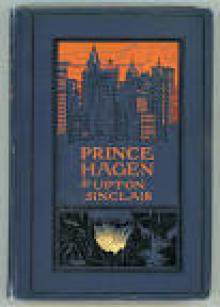 Prince Hagen
Prince Hagen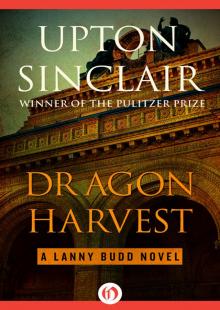 Dragon Harvest
Dragon Harvest The Jungle
The Jungle Sylvia's Marriage
Sylvia's Marriage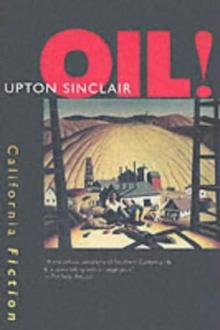 Oil! A Novel by Upton Sinclair
Oil! A Novel by Upton Sinclair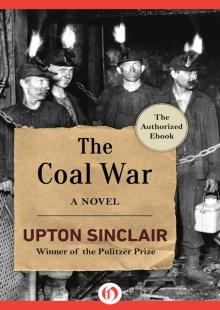 The Coal War: A Novel
The Coal War: A Novel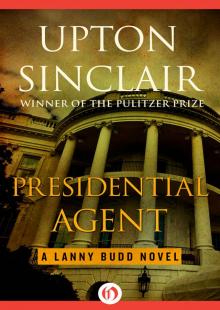 Presidential Agent
Presidential Agent World's End
World's End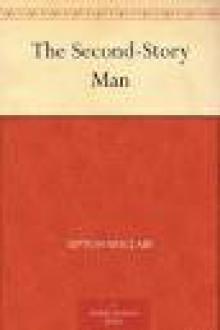 The Second-Story Man
The Second-Story Man O Shepherd, Speak!
O Shepherd, Speak!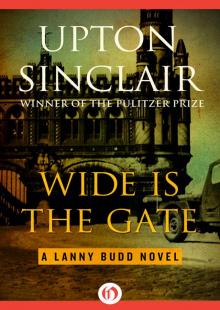 Wide Is the Gate
Wide Is the Gate The Return of Lanny Budd
The Return of Lanny Budd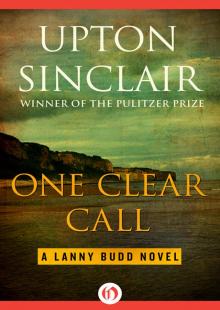 One Clear Call I
One Clear Call I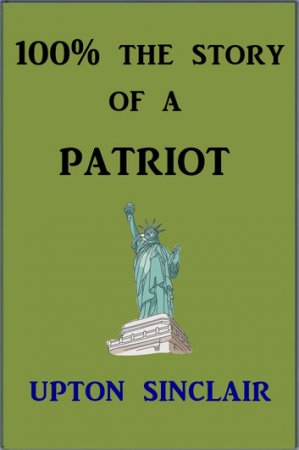 100%: the Story of a Patriot
100%: the Story of a Patriot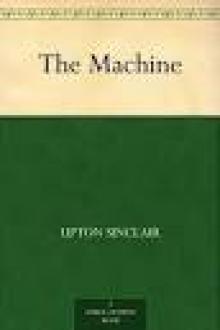 The Machine
The Machine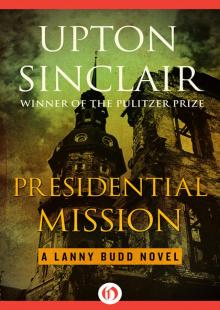 Presidential Mission
Presidential Mission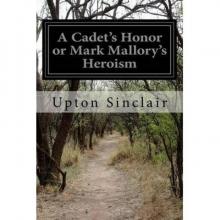 A Cadet's Honor: Mark Mallory's Heroism
A Cadet's Honor: Mark Mallory's Heroism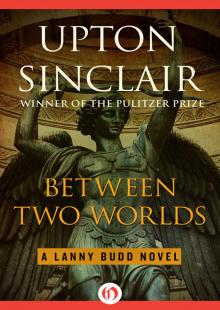 Between Two Worlds
Between Two Worlds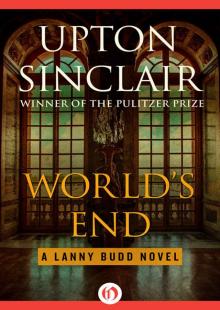 World's End (The Lanny Budd Novels)
World's End (The Lanny Budd Novels)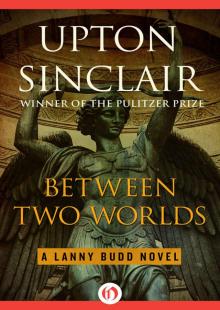 Between Two Worlds (The Lanny Budd Novels)
Between Two Worlds (The Lanny Budd Novels)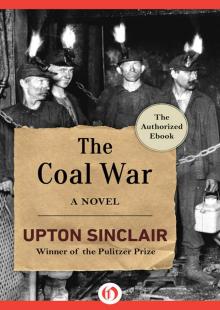 The Coal War
The Coal War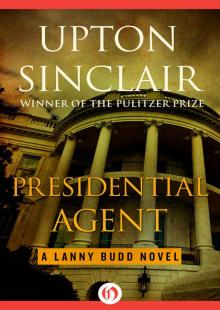 Presidential Agent (The Lanny Budd Novels)
Presidential Agent (The Lanny Budd Novels)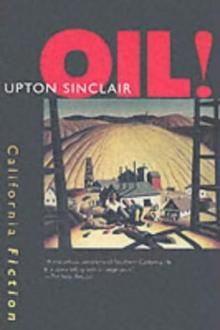 Oil (filmed as There Will Be Blood)
Oil (filmed as There Will Be Blood)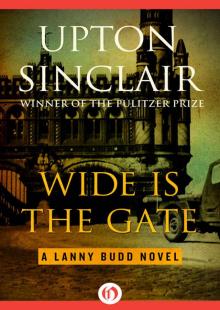 Wide Is the Gate (The Lanny Budd Novels)
Wide Is the Gate (The Lanny Budd Novels)